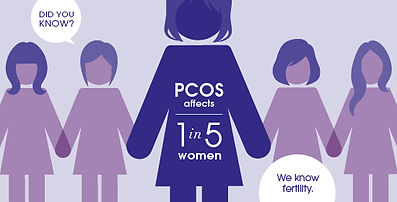RESEARCH PROJECTS

Canadian Women's Diagnostic and Lived Experiences with Polycystic Ovary Syndrome (PCOS)
From 2017-2019, we launched a qualitative study into women's diagnosis and lived experiences with PCOS. This study is part of a long-term research agenda to better understand the reason behind lengthy diagnosis experiences, particularly in Canada, misdiagnoses/errors, disclosure/social support, and patient-practitioner communications, and the impact these lags have on women's health, well-being, and quality of life. We are also exploring links between PCOS and IPV, as well as medical gaslighting, and forms of resistance/self-advocacy, and are compiling information/education and advocacy resources under our resources tab.
Here is a brief summary of what we found in our research on diagnosis lags (Soucie et al. 2021b)
Polycystic ovary syndrome (PCOS) is the most common endocrine syndrome that disproportionally affects women of
childbearing age (~8% to 13% of women worldwide). If unmanaged, it can lead to chronic, lifelong complications. Over
the past decade, improvements in diagnostic guidelines have not produced an expected reduction in the diagnostic
timeframe. We examined the potential reasons underlying this diagnosis delay. Participants first constructed a
diagnostic timeline and then charted and reflected on their diagnosis journeys. Through a reflexive thematic analysis,
five themes represented the most common diagnostic trajectory: (a) dismissal of adolescents’ early symptoms, (b)
negative diagnostic encounters, (c) wariness of treatment options, (d) uncertainty for the future, and (e) self-education
and advocacy. Our findings lead us to argue for education of physicians and allied professionals to strengthen patient-centered care delivery to women with a focus on building in training supports that include critically informed, social
justice foundations.
Here is a brief summary of what Noelle found in her research in relation to PCOS and disclosure for her Master's thesis
Polycystic Ovary Syndrome (PCOS) is the most common hormonal disorder in women of reproductive age, with prevalence rates up to 21%. Symptoms include ovarian cysts, menstrual irregularities, and possible infertility, as well as hirsutism, alopecia, and weight gain/obesity. These symptoms are distressing for many, and lead to psychological distress, poor body image, and reduced quality of life. They also may also cause feelings of social rejection, shame/embarrassment, and stigma which can complicate avenues for disclosure and social support, which are crucial in mitigating distress. The purpose of this qualitative study was to explore women’s experiences disclosing their PCOS diagnosis to others, and to understand how disclosure experiences impact avenues of social support. Twenty-eight PCOS-diagnosed participants (age range, 19-43; M=28.17, SD=6.03) were interviewed about their experiences disclosing PCOS to others. A reflexive thematic analysis of interview transcripts was conducted. Four themes were constructed that represented how disclosure and social support intersect and unfold over time, and across contexts: broaching PCOS with others, the building blocks of support, maintaining meaningful conversations, and dead ends. Findings of this study highlight the complexity of PCOS disclosures and social support experiences, while also providing tangible avenues of supports to improve quality of life. This study has direct implications for future research within the field of disclosure and chronic illnesses and has the potential to inform the development of services aimed at supporting women with PCOS.
Here is a brief summary on what we've found in our research on young women's experiences (18-22) with a new PCOS diagnosis (Samardzic, et al. forthcoming)
Polycystic ovary syndrome (PCOS), which affects 8-13% of reproductive aged women, is a highly gendered disorder whose symptoms disrupt Western conceptions of femininity. This may be especially debilitating for young women, who are targeted by societal discourses governing how they ‘should’ be. We interviewed 10 young, Canadian women aged 18 to 22 about how PCOS has influenced and/or conflated their conceptions of identity and (ab)normality within the current socio-cultural context. Using reflexive thematic analysis through a critical feminist lens, we present three themes: Justifying abnormality, Pathologizing the abnormal, and Fear of failure in pregnancy. Young women described feeling “weird” and “not normal” as a result of their symptoms and expressed worries about their ability to adhere to gendered expectations. We argue that the blanketing of these desirable states as ‘normal’ has pervasive implications for women’s lives and leaves them feeling defective and/or inadequate, which was further reinforced by implicit, gender-based power dynamics in medical institutions when women sought care. We suggest the need for engagement with discomfort and leveraging PCOS as a unique entryway into an analysis of intersectional issues to capture complexities in lived experience.
To all of our participants, thank you for participating in this study and for sharing your story with us! We are so grateful! (for more information or to reach out to us, please email me at ksoucie@uwindsor.ca)